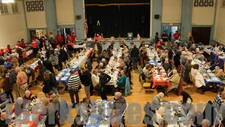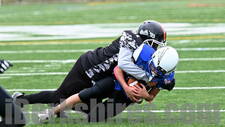iBerkshires.com Columnist SectionSue Bush
More articles from Sue Bush
American Red Cross Safety Message02:10PM / Tuesday, April 24, 2007
Summer is right around the corner and a wonderful time of year. Berkshire County children and parents as well as visitors to our area look forward to outdoor activities at area pools, lakes and rivers. Did you know that children have the highest death rate due to drowning?
The good news is that most water tragedies can be prevented if everyone remembers the basic rules of water safety. This is a reminder to everyone to have fun this summer without taking a vacation from safety.
The best time to prepare for accidents and emergencies is before they happen. The following tips will help keep everyone healthy and safe in or around the water.
Learn to swim and swim well. One of the best things anyone can do to stay safe in and around the water is learn to swim. No one, including adults, should ever swim alone. Adults should practice “reach supervision†which means to be within arm’s length of a child in case an emergency occurs. Enroll your children in a Red Cross swimming program today. Ask about swimming classes for older children and adults, too.
Outfit everyone with the proper gear. Kids – and even adults – who are not strong swimmers or who appear to rely on inflatable toys for safety should use U.S. Coast Guard approved personal flotation devices (PFDs) whenever they are in or around the water. Everyone, including strong swimmers, should use an approved PFD when boating. Each person should have the appropriate personal flotation device for his or her weight and size, which is found clearly marked inside the label near the Coast Guard stamp.
Always keep basic lifesaving equipment by the residential pool and know how to use it. A first aid kit, cordless phone, phone list with emergency contact information, a reaching pole and a ring buoy with a nylon line attached are recommended. Plastic makes the ring buoy so light even a child can save a life if the need arises. First aid kits should contain plastic face shields, which can help prevent disease transmission. Cordless phones allow you to make that 911 call and to receive calls without leaving the area. Just remember that with cell phones you have to be much more specific regarding your actual location. Unlike local land lines, calls to 911 from a cell phone do not connect to a local dispatcher.
These items coupled with a pool emergency action plan—similar to a fire drill—help the whole family breathe a little easier. In addition, the Red Cross recommends that pools be surrounded on all sides by a fence that is at least 4 feet high. It should not provide any footholds, which would allow a child to climb over or spacing to climb through. The fence should have a self-closing, self-locking gate that is locked when the pool is not in use.
Pack a “safety†bag for a day at the beach or lake. The properly packed safety bag will help ensure a fun day in which everyone comes home safe and sound. Water-proof sunscreen with an SPF 15 or higher, water shoes to keep feet safe from the heat and sharp objects on land and plenty of water are musts.
All containers should be plastic to prevent injuries from breaking glass. Also, a hat and sunglasses keep eyes safe from dangerous UV rays.
Learn Red Cross first aid and CPR. While the above tips can help prevent emergencies, it is important to know what to do if a situation arises.
And all caregivers, including grandparents, older siblings and babysitters should have these lifesaving skills. Contact your local Red Cross chapter today to find out where and when you can take a first aid or CPR course.
|
|
Advertise on
iBerkshires.com
|


















